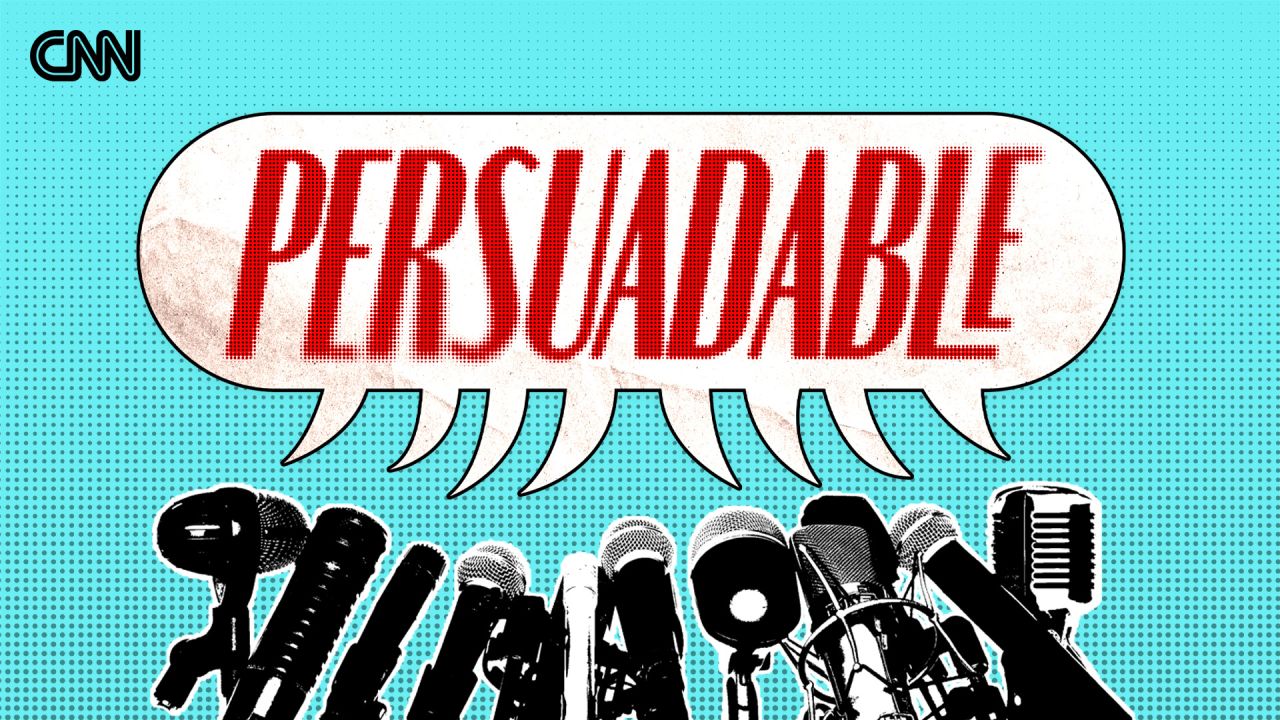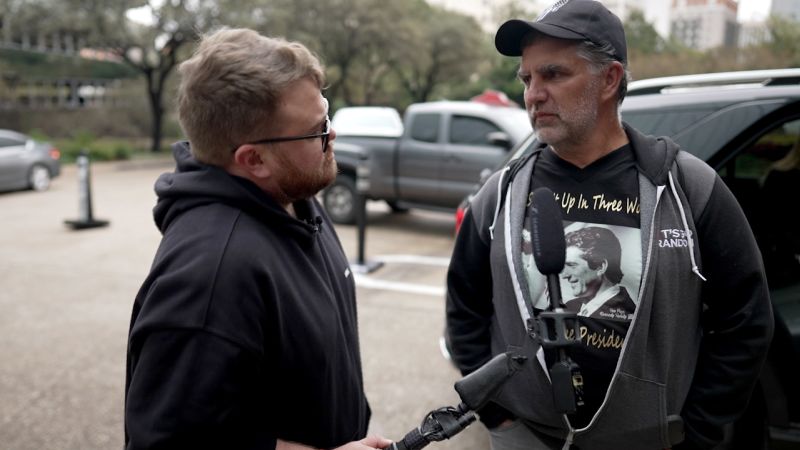CNN
—
Programming note: Listen to the first episode of Persuadable, a new podcast hosted by Donie O’Sullivan here.
“How can you talk to those crazy people?”
I get asked that question a lot.
Over the last few years, I’ve spoken to hundreds — possibly thousands — of Americans whose lives have become consumed by conspiracy theories.
It’s easy, perhaps natural, for us to want to label them all as “crazy.”
But it’s not true.
The overwhelming majority of people I have spoken to are highly productive members of society. They are moms, dads, business owners — they’re your next-door neighbor, your son, your daughter.
They are disillusioned, disaffected, and in some cases they are desperate. But they are not crazy.
They include the many Americans who don’t believe Lee Harvey Oswald acted alone in the assassination of President John F. Kennedy, as well as a group of people I once met who don’t even believe JFK is dead.
In fact, most of us hold some form of conspiracy theory or superstitious belief that others might consider absurd.
This kind of thinking can give us a sense of security by providing easy answers to difficult questions — certainty in uncertain times. It can provide a sense of purpose and community, a kinship among those who understand the “truth” or at least are on our side. An apparent antidote for an era of declining trust in institutions for an age when we are spending less time with each other and more time alone with our phones.
Fear and isolation: It’s why conspiracy theories flourished during the Covid-19 pandemic lockdowns. But for many families, the rabbit holes of 2020 are not a distant memory, they’re an ongoing reality. A loved one coming to the kitchen table every night repeating bizarre claims about vaccines and cabals, becoming increasingly frustrated as their families fail to embrace their newfound “truth.”
Every time I do a story about these kinds of beliefs I receive emails, messages, and hear from people on the street about their brother, their mom, their friend who’s stuck down the rabbit hole. Their question for me is always the same: “How can I help them?”
I never really had an answer. As a journalist on the misinformation beat, I viewed my job more as covering the phenomena of conspiracy theories, how they spread and how they affect people. Occasionally my editor at CNN, perhaps distraught by the seemingly infiniteness of the subject matter, would ask if there were any solutions we could include at the end of a story to make it “less depressing.” There weren’t.

The Account from CNN
Persuadable: Why Do We Believe Crazy S**t?
Conspiracy theories are not new. They’re as old as time itself. But if you feel like they’re everywhere right now, you’re not alone. So, what do you do when somebody you love has fallen down a rabbit hole? CNN’s Donie O’Sullivan has been covering the world of misinformation for more than a decade, but now he’s less interested in what people believe than why they believe it. So, he’s trying to find out.
See more of Donie’s interview with Dr. Samuel Veissière on YouTube.
Apr 30, 2025 • 33 min
…
But in Persuadable, a new limited series podcast from CNN Audio, we try to start a productive conversation about solutions.
Step One is empathy.
After years of talking to people with irrational beliefs, I began to think about some of my own.
I don’t believe in QAnon or the cabal. But I’ve had no shortage of irrational thoughts and obsessions. I’ve long grappled with mental health issues — anxiety, depression, and a particular form of obsessive-compulsive disorder (OCD) that prompts distressing intrusive thoughts.
In my case, irrational beliefs pop up during times of personal uncertainty, stress, or change, and are normally rooted in a false sense of guilt and reasons why I ought to hate myself — thought patterns that are familiar to many who suffer from depression. If a family member gets sick, I can ruminate and convince myself that it is somehow my fault. It’s clearly irrational but at times I can spend days or weeks obsessing about this and telling myself that it is true.
It’s important to point out here you needn’t have mental health issues to hold irrational beliefs. I’m sure you can think of a time where you fell into a cycle of over-thinking something — maybe about a partner or an ex, or a situation at work, or something about your kid. You couldn’t stop thinking about it and the more you thought about it the more stressed you became. Then it turned out to be nothing. Looking back, you can see the thought was irrational in the first place — but it was probably fueled by a genuine fear or insecurity.
Indeed, psychologists I spoke to for this podcast explained how humans are wired to have irrational beliefs and that believing in conspiracy theories doesn’t mean someone has a mental illness.
I bring up my mental health experience because for me it is a way to unlock my own empathy for people who are mired in a world of conspiracy theories.

Why do people believe crazy conspiracy theories?
I’ve spoken through the years to a few people who’ve gone down the QAnon rabbit hole and come back out. They describe the fear, uncertainty, and struggles in their own lives that drove them to seek meaning and purpose in the first place. The brief relief they felt when they first thought they’d found a truth that made sense to them — before eventually realizing they’d need to go deeper and deeper into the lies to maintain that false sense of security, spiraling to a point where they thought they could never come back.
Most of us have hit similar lows in our lives — they just aren’t framed by QAnon and the belief our country is ruled by an evil cabal.
The people who’ve been able to get back out of the pit of despair and disinformation have all described one thing that was critical to allowing them to do so: a friend.
Having someone in their life who was willing to give them the space to come back with dignity and not be treated as a fool for the views they once espoused. That can be extremely difficult because oftentimes that someone is the person who had to sit and listen to the former believer’s nonsensical QAnon talking points for months or years on end.
Without creating that space, however, we risk giving our loved ones nowhere else to go but further into the conspiracy theory — where there is a community, albeit one built around a lie.
There are so many things that make it difficult or impossible to reach empathy here.
Not least, many rabbit holes are lined with hate, racism, antisemitism, and homophobia. How can you have empathy for someone who buys into a conspiracy theory that threatens a community of which you are a member?
There are no straightforward answers — but this is my attempt to try to at least start a solution-oriented conversation about an issue that affects an untold number of families in the United States and all around the world.
I am not a perfect messenger. There are plenty of times through the years I wish I had approached a believer in a conspiracy theory differently. Television news is not necessarily the best medium to unpack the sometimes-complicated reasons someone has arrived at their belief in a lie.
Trust in the so-called “mainstream media,” of which I am a part, is at an all-time low. Some of that is due to relentless attacks on the press, often from people acting in bad faith. But some of it is also rooted in fair criticism about how we cover and how we talk about people who believe things that are wrong.
I hope you listen to our podcast where we can talk about this a lot more.

